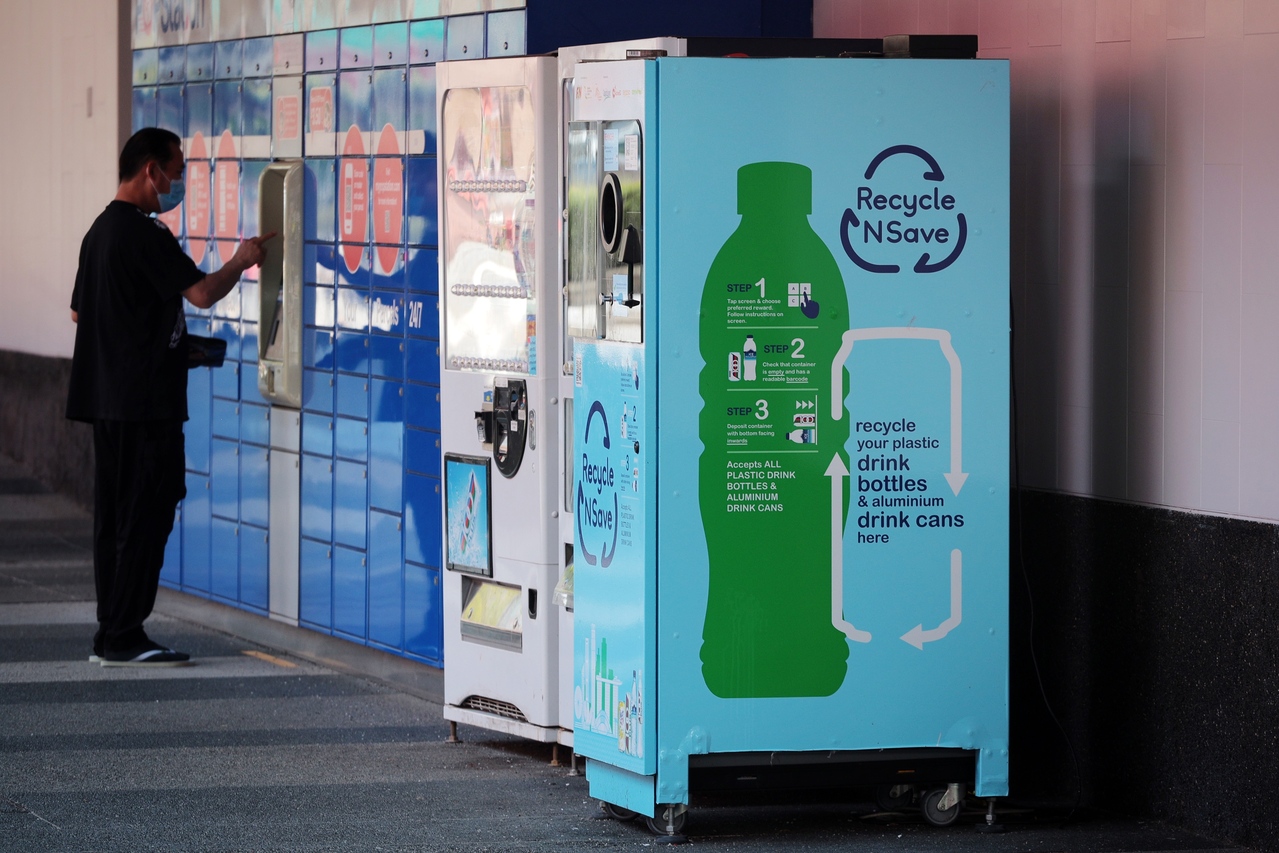Swedish firm eyeing S'pore base to deploy 'reverse vending machines' for bottle recycling
Sign up now: Get ST's newsletters delivered to your inbox

RVM Systems already has about 50 reverse vending machines rolled out by the National Environment Agency and F&N Foods since 2019.
PHOTO: ST FILE
SINGAPORE - A Swedish company that manufactures vending machines that accept used bottles and cans is planning to set up a base in Singapore by the third quarter of this year to support the nation's upcoming return scheme for beverage containers.
The company, RVM Systems, plans to install a range of its "reverse" vending machines, including those that can guzzle up 100 containers at a time.
It already has about 50 such machines here, rolled out by the National Environment Agency (NEA) and F&N Foods since 2019. Those machines, which can take up to 800 drink containers a day, dispense shopping rewards and ActiveSG credits, among other incentives.
To date, more than 10 million bottles and cans have been collected by the machines, which have been installed at places including schools, business parks and malls.
A similar Norwegian firm, Tomra, also launched a centre in Singapore last month, and is also planning to roll out reverse vending machines here. Visitors can deposit bottles into some machines at the centre to learn how they work.
This comes amid a renewed national push in recent years to get people to recycle more - and correctly - in Singapore. The domestic recycling rate in 2020 and 2021 plummeted to a 10-year-low of 13 per cent.
Singapore is in the midst of developing a return policy for beverage containers, where a deposit is included in their price. A consumer receives a refund when the used bottles and cans are returned.
In a Facebook post on April 12, Senior Minister of State for Sustainability and the Environment Amy Khor said NEA is shaping up key aspects of the scheme, such as the types of drink containers to include and the return points. The aim is to develop a suitable and cost-effective scheme.
RVM Systems has sold its machines to more than 35 markets globally, mostly to support similar return schemes, said Mr Ulf Wennblom, the company's area manager for the Asia-Pacific.
For Singapore's return scheme, he suggested that the deposit placed on each bottle and can should be between 10 and 25 cents, depending on the size of the containers.
"It is advisable to set the deposits higher than the market price of beverage containers, and it is better to start low and increase deposits later if needed, to increase collection," he said.
Overseas, the deposit amounts are set by the government.
Mr Wennblom added that the deposit and price of a drink should be stated separately on a price tag, to show customers that they are guaranteed to receive the refund, as long as they return the bottle for recycling.
If deposits are set too high, customers could be put off, affecting the beverage's sale, he added.
Collecting drink containers in reverse vending machines will maintain the value of the material and allow them to be recycled into similar containers, whereas those dumped with other recyclables would be easily contaminated, ending up as lower-quality materials such as landfill cover.
On top of getting the deposit right, the locations of return points matter, for convenience.
Mr Wennblom said most machines in other countries are placed in stores and supermarkets, since this fits shoppers' routines.
He noted that Singapore would be the first country in Asia to have a return scheme for beverage containers.
Such return schemes - universally known as deposit refund schemes - originated in the Nordic region, where recycling used bottles and cans have become part of the citizens' daily routine. Reverse vending machines are ubiquitous there.
Under such a scheme, there are normally more manual return points than reverse vending machines, but the machines collect more than 90 per cent of the empty bottles and cans, since the machines can flatten and sort the containers.
Norway started its scheme in the 1990s, and now has a return rate of 95 per cent.
Deposit refund schemes are partially financed by the producers and importers of drink containers.
To keep the return scheme cost-effective without sacrificing container collection numbers, Mr Wennblom said the vending machines should be designed to be space-efficient.
The scheme should also operate in an open market for reverse vending machine suppliers, as that would nurture innovation, he added.
Mr Eshton Chua, 27, who recycles regularly but has not used a reverse vending machine before, said the machines could also be deployed at every few blocks of flats and along routes most frequented by residents.
"More Singaporeans should realise that recycling is a step that should be as routine as taking out trash daily," said Mr Chua, who runs a sustainable fashion business.


